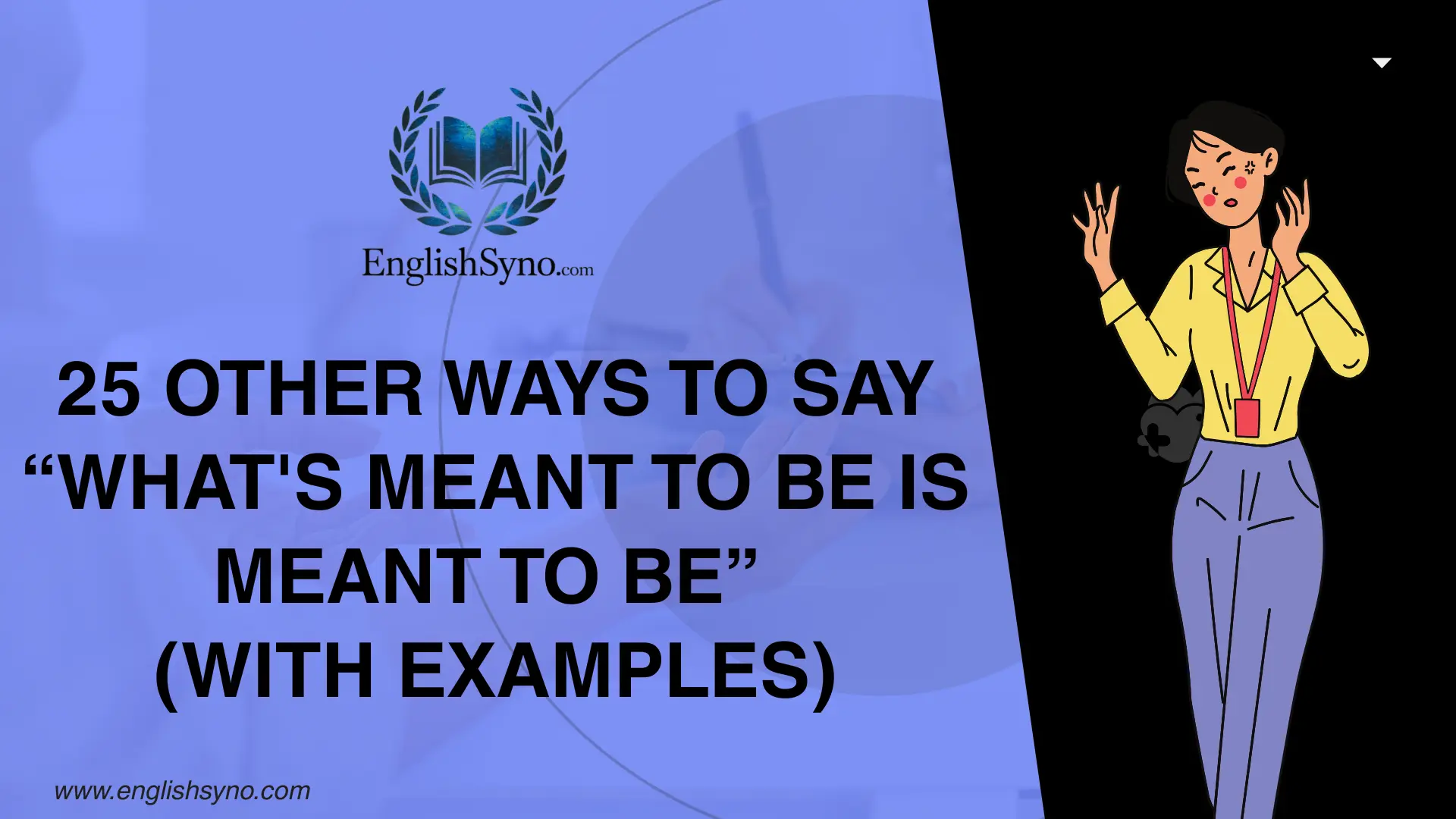In life, I’ve often felt that things unfold in ways we can’t always predict. What’s Meant to Be is Meant to Be captures this beautifully, as it suggests that something or someone is designed, destined, and ready to possess a particular trait or achieve a certain state at the right time. It implies a sense of inevitability, where choices, timing, and a predestined path quietly align. Whether we meet the right person or find an unexpected opportunity, each moment feels less like a coincidence and more like fate guiding us gently forward.
Through my experiences, I’ve learned that this phrase holds more than belief-it’s about trust and surrender. It carries a deep connection to destiny and purpose, reminding us that not everything requires force or explanation. When we wonder, “What does it truly mean to follow this rhythm?” we find that understanding, patience, and acceptance turn our delays or detours into a meaningful part of our path. Some moments happen not because we plan them perfectly, but because they were always waiting to meet us.
What Does “What’s Meant to Be is Meant to Be” Mean?
The phrase “What’s Meant to Be is Meant to Be” means that life unfolds according to fate, destiny, or natural timing. It reflects acceptance that some things are beyond our control, and that outcomes occur the way they are supposed to. This saying conveys a calm surrender to life’s path and helps us embrace uncertainty with trust and faith.
Definition: A phrase suggesting that events happen for a reason and are predetermined by fate or destiny.
Meaning: Acceptance of life’s natural flow without forcing outcomes.
Explanation: It encourages patience and inner peace when facing uncertainty or disappointment.
When to Use “What’s Meant to Be is Meant to Be”
You can use this phrase when someone is struggling to accept a situation, waiting for something uncertain, or reflecting on life’s timing. It’s particularly comforting in conversations about relationships, career paths, or missed opportunities.
Is It Professional/Polite to Say “What’s Meant to Be is Meant to Be”?
Yes, it’s polite, but its tone is emotional rather than formal. In professional settings, it can sound too personal, so it’s best used when expressing empathy rather than discussing business outcomes.
Pros or Cons
Pros:
- Encourages calmness and trust in the future.
- Expresses empathy and emotional intelligence.
- Helps ease anxiety or disappointment.
Cons:
- It can feel vague or overly spiritual to some.
- It might sound passive if used too often.
Everything Happens for a Reason
Meaning: Life’s events, whether joyful or painful, carry a purpose behind them.
Explanation: This phrase reassures that every challenge contributes to growth or change.
Example: “I didn’t get the job, but I believe everything happens for a reason.”
Best Use: When offering comfort after a setback.
Worst Use: Immediately after a painful event.
Tone: Supportive, gentle.
It Was Meant to Happen That Way
Meaning: Accepting that events unfolded as they were intended.
Explanation: Helps the listener understand that outcomes have significance even if unclear now.
Example: “Maybe the delay was meant to happen that way.”
Best Use: After an unexpected change of plans.
Worst Use: When someone needs a practical solution.
Tone: Comforting, patient.
That’s Just How Life Works
Meaning: A reminder that life has its own unpredictable rhythm.
Explanation: Suggests acceptance of circumstances we can’t control.
Example: “We did our best; that’s just how life works sometimes.”
Best Use: When discussing outcomes that can’t be changed.
Worst Use: If the listener is seeking emotional reassurance.
Tone: Realistic, calm.
It Was Written in the Stars
Meaning: The situation was destined or fated to happen.
Explanation: Comes from the idea of destiny being influenced by the universe.
Example: “They met in such a strange way-it was written in the stars.”
Best Use: Romantic or reflective contexts.
Worst Use: Formal or professional discussions.
Tone: Poetic, heartfelt.
Fate Had Other Plans
Meaning: The outcome was different from what was expected, due to destiny’s influence.
Explanation: Encourages acceptance when things don’t go as planned.
Example: “We wanted to meet today, but fate had other plans.”
Best Use: Casual conversations about unexpected outcomes.
Worst Use: Situations requiring accountability.
Tone: Light, understanding.
Some Things Are Just Out of Our Hands
Meaning: Not everything is within our control.
Explanation: A gentle way of saying we can’t change certain results.
Example: “We did all we could-some things are just out of our hands.”
Best Use: Professional or personal reassurance.
Worst Use: When used to avoid responsibility.
Tone: Honest, empathetic.
Let Life Take Its Course
Meaning: Allow things to unfold naturally without interference.
Explanation: Encourages patience and faith in timing.
Example: “Let’s just let life take its course and see where it leads.”
Best Use: When advising someone to stay calm during uncertainty.
Worst Use: During urgent decision-making.
Tone: Peaceful, wise.
What’s Done Is Done
Meaning: Accepting the past and moving forward.
Explanation: Reminds others not to dwell on mistakes.
Example: “You can’t change it now-what’s done is done.”
Best Use: When encouraging closure.
Worst Use: In sensitive or emotional contexts.
Tone: Firm but caring.
Life Has Its Own Plans
Meaning: Life often unfolds differently than expected.
Explanation: Encourages acceptance of surprises.
Example: “We planned so much, but life has its own plans.”
Best Use: When outcomes are unpredictable.
Worst Use: If used dismissively.
Tone: Thoughtful, compassionate.
The Universe Knows Best
Meaning: A belief that higher forces guide events.
Explanation: Expresses trust in divine or cosmic timing.
Example: “Don’t worry; the universe knows best.”
Best Use: In spiritual or motivational conversations.
Worst Use: In skeptical audiences.
Tone: Optimistic, spiritual.
Trust the Process
Meaning: Have faith that things will work out as they should.
Explanation: Encourages patience during uncertainty.
Example: “It’s hard now, but trust the process.”
Best Use: During times of change or growth.
Worst Use: When the listener needs quick results.
Tone: Motivational, reassuring.
It Was Bound to Happen
Meaning: The event was inevitable.
Explanation: Suggests that circumstances naturally led to the outcome.
Example: “Given their chemistry, it was bound to happen.”
Best Use: When outcomes feel expected.
Worst Use: When the event caused distress.
Tone: Neutral, accepting.
Everything Finds Its Way
Meaning: Over time, situations resolve themselves.
Explanation: Inspires hope that order will come from chaos.
Example: “Don’t rush; everything finds its way eventually.”
Best Use: Comforting someone in waiting.
Worst Use: When urgency is needed.
Tone: Gentle, hopeful.
The Timing Wasn’t Right
Meaning: Something didn’t happen because the time wasn’t ideal.
Explanation: Suggests patience and future possibilities.
Example: “It didn’t work out-the timing wasn’t right.”
Best Use: Discussing missed opportunities.
Worst Use: When accountability is required.
Tone: Soothing, understanding.
It’s All Part of the Plan
Meaning: Every experience contributes to a greater purpose.
Explanation: Encourages faith in life’s blueprint.
Example: “Even this setback-it’s all part of the plan.”
Best Use: During life transitions.
Worst Use: When emotions are raw.
Tone: Comforting, reassuring.
What’s Yours Will Find You
Meaning: What is truly meant for you cannot miss you.
Explanation: This phrase assures that opportunities, people, and moments meant for you will always come, even if delayed.
Example: “Don’t stress about it-what’s yours will find you in time.”
Best Use: When comforting someone who feels left behind.
Worst Use: When someone needs immediate motivation or action.
Tone: Reassuring, patient, and hopeful.
Some Things Are Just Meant to Be
Meaning: Certain events or relationships are destined to happen.
Explanation: This phrase emphasizes the natural course of fate, reinforcing acceptance and peace.
Example: “They met in college and fell in love-some things are just meant to be.”
Best Use: Romantic or nostalgic contexts.
Worst Use: During logical or professional discussions.
Tone: Sentimental, peaceful.
What’s for You Won’t Pass You
Meaning: What is destined for you will never be taken away.
Explanation: Encourages trust in divine timing and fate’s guidance.
Example: “If that job was truly for you, it won’t pass you by.”
Best Use: Offering emotional reassurance after rejection.
Worst Use: When quick problem-solving is needed.
Tone: Calm, faith-filled, encouraging.
It’s Out of Our Control
Meaning: Some outcomes can’t be changed by human effort.
Explanation: Promotes letting go when situations are beyond influence.
Example: “We’ve done all we can-it’s out of our control now.”
Best Use: To bring closure to challenging discussions.
Worst Use: When responsibility still needs to be taken.
Tone: Honest, reflective.
Time Will Tell
Meaning: The truth or outcome will be clear eventually.
Explanation: Encourages patience and trust in time’s revealing power.
Example: “We’re unsure how it’ll go, but time will tell.”
Best Use: When results are uncertain.
Worst Use: When someone needs clear answers quickly.
Tone: Balanced, neutral, patient.
Everything Falls into Place
Meaning: Life eventually organizes itself into harmony.
Explanation: Suggests that even chaos has purpose and will resolve with time.
Example: “Don’t worry-everything falls into place eventually.”
Best Use: Encouraging someone who feels lost.
Worst Use: In moments of deep grief or frustration.
Tone: Encouraging, soothing.
It Is What It Is
Meaning: Acceptance of circumstances that can’t be changed.
Explanation: Encourages detachment and emotional balance when facing reality.
Example: “We can’t undo it now-it is what it is.”
Best Use: To end conversations about irreversible outcomes.
Worst Use: When empathy or deeper comfort is needed.
Tone: Stoic, neutral, simple.
Go with the Flow
Meaning: Adapt to life’s direction instead of resisting it.
Explanation: Encourages flexibility and calm acceptance of unexpected changes.
Example: “Plans changed, but I’ll just go with the flow.”
Best Use: Casual, relaxed contexts or personal advice.
Worst Use: In serious or high-stakes conversations.
Tone: Lighthearted, calm, carefree.
Some Things Aren’t Meant to Last
Meaning: Not every connection or situation is permanent.
Explanation: Helps in accepting the temporary nature of experiences.
Example: “That friendship taught me a lot-some things aren’t meant to last.”
Best Use: Reflecting on endings or closure.
Worst Use: When comforting someone in fresh heartbreak.
Tone: Reflective, understanding.
Trust That It Happened for a Reason
Meaning: Every event serves a greater purpose, even if unseen.
Explanation: Inspires hope and wisdom through acceptance.
Example: “It’s tough now, but trust that it happened for a reason.”
Best Use: During times of confusion or disappointment.
Worst Use: In moments of deep grief or trauma.
Tone: Compassionate, wise, and uplifting.
Final Thoughts
When we say “What’s Meant to Be is Meant to Be,” we embrace a mindset of trust, acceptance, and peace. Life often brings unexpected twists, but this belief helps us let go of what we can’t control and focus on what we can-our attitude, growth, and resilience. It reminds us that every experience, whether joyful or challenging, serves a purpose in shaping who we are. Sometimes, the things we lose or miss out on redirect us to something better, even if we don’t see it immediately.
Through this phrase, we learn that timing, faith, and patience can be just as important as effort. Not everything is meant to happen right away-and that’s okay. By trusting in the natural flow of life, we open ourselves to new possibilities and deeper understanding. So, whenever life feels uncertain, remember that what’s truly meant for you will always find its way. It’s not about giving up-it’s about believing that everything unfolds exactly as it should.
FAQs
What does “What’s Meant to Be is Meant to Be” mean?
It means everything happens for a reason, guided by timing, fate, or destiny. It encourages acceptance and peace with life’s flow.
Is saying “What’s Meant to Be is Meant to Be” positive?
Yes, it’s a positive phrase that inspires hope and patience, reminding you to trust life’s journey.
When should I use “What’s Meant to Be is Meant to Be”?
Use it when comforting someone going through uncertainty, loss, or a major change in life.
Is this phrase spiritual or philosophical?
It can be both-some see it as faith-based, while others view it as a peaceful life philosophy.
Can I say it in professional settings?
Use cautiously-it suits supportive messages but not formal business discussions.
What’s the emotion behind this phrase?
Calm acceptance, faith, and emotional maturity are the main feelings it conveys.
Is “What’s Meant to Be is Meant to Be” similar to fate?
Yes, it aligns with the belief that fate or destiny shapes life events.
Why do people say it after heartbreak?
Because it helps them accept loss and trust that something better awaits.
What are better ways to say it?
Alternatives include “Everything happens for a reason” or “Trust the process.”
Can it be used in writing or speeches?
Yes, it’s perfect for reflective or motivational writing and closing statements.
Does it mean we shouldn’t try?
No-it means balance effort with acceptance, not giving up on goals.
What’s the tone of this phrase?
It’s calm, reflective, and emotionally supportive.
Is this phrase used in relationships?
Yes, it’s often used to express faith in love or timing.
How does it relate to destiny?
It directly connects to the belief that life follows a destined path.
Why is it comforting?
Because it helps people release control and find peace with life’s timing.

Muhammad Altaf is an English language specialist and professional content strategist with over 10 years of experience writing and teaching practical English usage, professional communication, and tone awareness. His work focuses on helping readers express ideas clearly, naturally, and confidently in real-world contexts.


